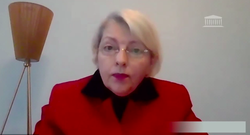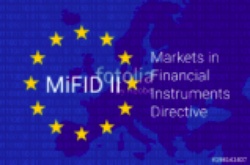The recent news
March 4, 2021
Compliance: at the moment

<iframe src="https://www.linkedin.com/embed/feed/update/urn:li:share:6771321538693083136" height="584" width="504" frameborder="0" allowfullscreen="" title="Post intégré"></iframe>
March 3, 2021
Teachings : Banking and Financial Regulatory Law - Semester 2021

Résumé de la leçon. Dans son lien avec la gouvernance, le Droit de la régulation bancaire et financière a l'ambition d'organiser la façon dont les pouvoirs s'organisent au sein des entreprises, son prisme le conduisant à orienter cette gouvernance vers la protection de l'épargne, des investisseurs et des marchés. Imprégnant ainsi le Droit des sociétés, c'est contre cela que le rapport Notat-Senard a réagi, puis ce que la loi dite PACTE du 22 mai 2019 a cristallisé.
Il demeure que si la société est cotée, ce qui ne correspond pas à toutes les entreprises, le Droit de la régulation continue à influer cette gouvernance à travers le principe de transparence. Celui-ci accroit son emprise lorsqu'il y a une perspective de changement de contrôle. En effet les marchés financiers ne sont pas que des marchés de rendements pécuniaires : ils sont aussi des marchés de pouvoirs, ce qui renvoie à la double nature du titre de capital : son titulaire peut revendiquer des droits patrimoniaux (potentiels) mais aussi des droits politiques actifs, même s'ils n'emportent pas forcément pouvoir de décision.
Ce marché du pouvoir et du contrôle des sociétés est par excellence le marché boursier. Les prises de contrôle, qui pourraient en rester à la nature de contrats d'achat et de vente, sont entièrement gouvernées par l'Autorité de Régulation. L'on part donc du principe d'une offre, mais il peut arriver que cette offre d'achat (ou d'échange) devienne "obligatoire", lorsque des seuils de prise de contrôle sont déjà atteints. Même lorsque des textes interviennent dans un sens libéral, comme en ce qui concerne le contrôle des montants proposés par les offreurs dans le mécanismes d'OPA ou d'OPE les directives de l'Union européennes demandant à ce que les Régulateurs ne contrôlent plus le caractère "équitable" de celui-ci, les juges admettent que par le visa de l'office général du Régulateur et la bonne information de l'actionnaire un tel contrôle soit maintenu, voire accru (cas Altice).
Le marché financier pénètre déjà dans cette régulation des pouvoirs sociétaires lorsque la société est "exposée" au marché financier par la cotation de ses titres sociaux, ou par le mécanisme plus général de financement de marché, les investisseurs titulaires de titres de créance demandant le bénéfice de la même transparence, voire des droits politiques analogues à ceux dont bénéficient les titulaires des titres de capital. Mais les entreprises, à travers leur structuration sociétaire, sont définitivement "ouvertes" lorsque leur capital, c'est-à-dire non seulement leur richesse mais encore le pouvoir politique, est disponible sur ce marché financier spécifique qu'est le marché boursier. Le Droit régule alors les procédés de "prise de contrôle", tâche première de l'Autorité des marchés financiers, car si le pouvoir est par principe disponible, la "loi des volontés" ne peut suffire. L'on retrouve alors, mais sous une forme plus nette, les lois du capital, des volontés et des intentions.
Le Droit pose en effet le principe même des "offres publiques", les opérateurs devant tout d'abord révéler leur "intention" de prendre le contrôle, puis devant offrir à tout actionnaire une contrepartie soit en argent soit en titres. Dans cet achat du pouvoir, le Régulateur boursier joue un rôle central, mais les textes européens dans une perspective plus libérale que précédemment ont posé qu'il n'a pas à contrôler le caractère équitable du prix que l'initiative de l'offre propose, concentrant davantage son pouvoir sur l'information due aux personnes "intéressées", ce qui est excède le seul cercle des titulaires des titres de capital, pour concerner le cercle de la catégorie qui commence à s'implanter dans le nouveau Droit des sociétés qui se dessine : les "parties prenantes". Par la régulation des "prises de contrôle des sociétés ouvertes", l'on quitte de plus en plus l'idée d'une Régulation jouxtant l'économie administrée, parce qu'il s'agirait de la puissance étatique tenant les structures du marché financier afin que celui-ci soit fiable, le premier principe étant la transparence, pour aller vers une Régulation jouxtant la "Gouvernance" des sociétés qui sont exposées aux marchés financiers et qui à ce titre doivent admettre que leur fonctionnement politique doit être transparent, notamment au regard du futur de l'entreprise, voire partagé avec ceux qui ont un intérêt financier avec ce fonctionnement, voire avec également ceux qui y ont un intérêt non directement financier. En cela, le Droit de la Régulation des marchés financiers, en procéduralisant et en contrariant le fonctionnement trop brutal de ceux-ci, est le bastion avancé d'un fonctionnement plus général des sociétés, de nombreuses dispositions ayant tendance à être bilatéralisées dans le Droit des sociétés non-cotées, puisque cette distinction n'existe pas formellement par ailleurs dans le Droit des sociétés.
Revenir aux bases avec le Dictionnaire bilingue du Droit de la Régulation et de la Compliance
Revenir au plan général du cours de Droit de la Régulation bancaire et financière
Revenir à la présentation générale du cours de Droit de la Régulation bancaire et financière
Utiliser les matériaux ci-dessous pour aller plus loin et préparer votre conférence de méthode.

Feb. 25, 2021
Publications

Référence complète : Frison-Roche, M.-A., La "crise économique", la concevoir et intégrer ouvertement de l'insécurité juridique. Comment la concevoir ? Quel régime juridique concevoir pour une insécurité juridique admise, voire requise ?
Ce document de travail a été élaboré pour servir de base à une intervention : L'avenir de la notion d'insécurité juridique au regard du traitement des situations extraordinaires : crise économique, dans le colloque "Insécurité juridique : émergence d'une notion ?, Cour de cassation, 22 mars 2021, Paris.
___________
"whatever it takes"!footnote-2054. Mario Draghi, par cette formule visait en 2015 l'objectif de défense de la monnaie européenne, lorsque l'Euro risquait de s'effondrer sous la danse des spéculateurs enrichis de son effondrement. On a rarement fait formule plus violemment politique et plus fortement normative. Elle a participé à le faire surnommer comme dans le jeu vidéo "Super Mario". La formule a été reprise en 2020 par le Président de la République Française face aux désordres financiers engendrés par la crise sanitaire ayant engendré de semblables calculs!footnote-2055. Elle excède le seul "coût financier"!footnote-2057. Par cette formule, le président de la Banque Centrale Européenne, a posé que la situation de crise économique était telle en Europe que tout pour y mettre fin y serait déployé par l'Institution, sans aucune limite ; que tous ceux qui par leurs comportements, même appuyés sur leurs prérogatives juridiques, en l'espèce les spéculateurs, parce qu'ils détruisaient le système économique et financier, allaient buter sur cela et seraient eux-mêmes balayés par la Banque Centrale car la mission de celle-ci, en ce qu'elle est d'une façon absolue la sauvegarde de l'Euro lui-même, allait prévaloir "quoi qu'il en coûte".
A un moment, le maître se lève. Si la position royale est la position assise lorsque, pondéré, il écoute et juge, c'est en se levant qu'il montre son acceptation d'être aussi le maître parce qu'il est en charge de plus et qu'il fera usage de tout pour gagner.
A situation financière exceptionnelle, tous les moyens de politique monétaire sont donc bons. C'est ce qui fût dit. Sans aucune limite. Et ce ne n'est pas un principe comme celui de la sécurité juridique, ayant permis à des personnes de jouer de leurs droits, par exemple celui de spéculer, d'engranger par avance des prérogatives sur la situation de demain, qui aurait pu empêcher cette puissance de jure permettant de sauver l'Europe. Car à prendre littéralement la formule, même si c'est au prix des droits acquis et des règles précédemment posées qu'il aurait valu payer, s'il avait valu faire page blanche pour en écrire de toutes nouvelles pour sauver l'Europe, la plume de Draghi les aurait tracées sans s'arrêter à cela. Ainsi, par une telle formule c'est par la Grande Porte, celle de la crise économique et financière, que l'insécurité juridique est entrée dans le Droit.
Dans le cas de la crise de 2008, la parole suffît puisque la perspective d'une intervention sans limite du pouvoir monétaire sans limite de la Banque centrale fit que les agissements spéculatifs dévastateurs ne déferlèrent pas. Avoir levé la règle de Droit en ce qu'elle suppose la limite en affirmant qu'il y aurait prévalence absolue du but, suffît donc en Ex Ante pour que la crise ultime ne s'ouvre pas. Cet épisode, digne d'Homère, suffit à éclairer l'insécurité juridique par une de ses dimensions lorsqu'elle est non seulement admissible mais requise : elle peut constituer un acte héroïque.
Dans une telle perspective, plutôt que de laisser l'insécurité juridique dans l'ombre ce qui ne serait qu'une sorte d'imperfection (parce que l'insécurité juridique ne serait donc que l'imperfection de la sécurité juridique), par l'idée par le "légalisme" devrait avoir des limites, que "le Droit n'est pas tout" et qu'il faudrait savoir "fermer les yeux"..., il faudrait plutôt assumer de dire que certaines circonstances il faut dire haut et fort, c'est-à-dire le dire de jure , l'insécurité juridique est légitime, licite, conforme à la hiérarchie des normes juridiques.
En cela, dessiner le concept positif de l'insécurité juridique (ce qui ne peut que plaire aux hégéliens), accroît la sécurité juridique : ainsi cela permet d'associer aux hypothèses d'insécurité juridique un régime juridique plus clair. En effet, plutôt que de mettre sous le tapis le Droit, ce qui explique bien des tensions entre le Conseil constitutionnel et le Conseil d'Etat d'une part et le Législateur et le Gouvernement d'autre part concernant "l'Etat d'urgence", l'on pourrait disposer des conditions dans lesquelles l'insécurité juridique permet d'écarter ou de limiter des règles.
Il est posé comme hypothèse qu'à l'avenir une certaine doser d'insécurité juridique pourrait être ouvertement admise : cela serait donc juridiquement conçu, le Droit gagnant toujours avancer à visage découvert. Même si l'on apprécie la "flexibilité" du Droit, il est toujours dangereux en Droit d'affirmer appliquer des règles tout en ne les appliquant pas.
L'idée proposée est donc que dans des "situations extraordinaires", l'insécurité juridique serait une dimension, voire un principe admissible. Et développant ce premier point il est proposé que l'hypothèse d'une "crise économique" justifie une dimension, voire un principe d' "insécurité juridique".
Mais cette première affirmation est à éprouver. En effet, une crise économique, notion qu'il convient de définir, si elle doit avoir un effet si majeur de retournement, est-elle une "situation" si extraordinaire que cela ?
En outre, pour traiter cette situation extraordinaire que constitue une "crise économique", quelle dose d'insécurité juridique serait juridiquement admissible, voire pourrait être juridiquement revendiquée ? Voire pourrait-on concevoir un renversement de principe qui conduirait le Droit applicable à une crise économique sous l'égide de l'insécurité juridique ?
Dans un tel cas, la question qui se pose alors est de déterminer les conditions et les critères de la sortie de la crise économique, voire de déterminer les éléments de perspective d'une crise économique, qui pourrait justifier par avance l'admission d'injection d'insécurité juridique. Le Droit a avant tout maîtriser sur le temps futur.
Feb. 18, 2021
Hearings by a Committee or Public organisation

🌐suivre Marie-Anne Frison-Roche sur LinkedIn
🌐s'abonner à la Newsletter MAFR Regulation, Compliance, Law
____
► Référence complète : M.-A. Frison-Roche, audition par la Missions Evaluation de la loi dite "Sapin 2" au regard d'une "Europe de la Compliance" et réponses aux diverses questions posées, in auditions menées par par la Mission d'évaluation de la Loi relative à la transparence, à la lutte contre la corruption et à la modernisation de la vie économique, la loi dite "Sapin 2" dirigée par les députés Raphaël Gauvain et Olivier Marleix, Assemblée nationale, 18 février 2021.
____
L'Assemblée Nationale a confié à cette mission "d'établir un bilan approfondi des principaux apports de la loi "Sapin 2" et, si cela apparaît nécessaire, de proposer des pistes d'amélioration".
Regarder la video de l'intervention.
____
Se reporter à la présentation générale de la mission d'évaluation.
Se reporter à l'agenda de l'ensemble des auditions.
____
Lire ci-dessous les points essentiels sur lesquels s'est appuyée la présentation préalable de quelques minutes, centrée sur les points de méthode au regard de la perspective européenne, avant que le temps ne soit utilisé pour répondre aux questions posées par Messieurs les députés Raphaël Gauvain et Olivier Marleix.
Feb. 9, 2021
Conferences

Full reference : Frison-Roche, M.-A., Devoir de vigilance des entreprises : vers un Droit de la responsabilité ex ante ? (Duty of vigilance for companies: towards an ex ante liability law?), conference-debate, The Faculty of Law, University of Oslo, Norway, 9th of February 2021.
The conference-debate is moderated by Catherine Banet, Associate Professor, Scandinavian Insitute of Maritime Law, Department of Energy and Resources Law, University of Oslo

Feb. 8, 2021
Publications

 ► Référence complète : Frison-Roche, M.-A., L'invention de la vigilance : un terme nouveau pour une Responsabilité en Ex Ante, Document de travail, février 2021.
► Référence complète : Frison-Roche, M.-A., L'invention de la vigilance : un terme nouveau pour une Responsabilité en Ex Ante, Document de travail, février 2021.
____
Ce document de travail sert de base à une conférence donnée à Oslo le 9 février 2021.
Pour aller plus loin, ➡️La Responsabilité Ex Ante, 2022
____
Lire ci-dessous le document de travail⤵️
Updated: Feb. 6, 2021 (Initial publication: Dec. 17, 2020)
Conferences

Référence : Frison-Roche, M.-A., Personnage du "Juge Unique" dans le procès pour s'amuser Procès de Denis Mazeaud.
Initiative des étudiants de Denis Mazeaud et plus particulièrement de l'Association Les As d'Assas.
Il faut bien se mettre à 6 ou 7, pour tenter de mettre en difficulté l'As des As qu'est Denis Mazeaud...
L'ensemble des mises en accusation par les uns et les autres puis contre chaque réquisitoire la défense par Denis Mazeaud de Denis Mazeaud (qui n'a pas voulu d'avocat) a lieu de 16h30 à 17h15.
Membres de la Cour, avant que l'accusé - qui ne connaissait rien de son dossier ni des juges qui lui avaient été préparés - rien :
Marie-Anne Frison-Roche, présidente et juge unique
Jean-Sébastien Borghetti, professeur à Paris 2
Pierre Seydoux, directeur honoraire du Recueil Dalloz
Lire plus d'informations sur le site de l'Association.
____
Dans un procès pour rire contre Denis, que chacun des accusateurs prit soin de peindre en noir pour qu'il en voit de toutes les couleurs afin de mieux rayonner comme il me mérite, ma place était la plus facile.
Etant juge, et juge unique (juge unique, juge inique), j'ai pu encore plus le traiter mal, sans plus de ménagement que les autres.
J'ai pu ainsi rappelé afin que nul n'ignore ses méfaits que lors du concours d'agrégation que nous passâmes ensemble, concurrents donc, il y avait un troisième candidat (hors de la cause ici, heureusement pour lui..., en la personne de Rémy Cabrillac....), au lieu de suivre la règle implicite de "chacun pour soi et si tu perds je gagne", nous avons tous trois fait à trois la Leçon de 24 heures de chacun.
C'est ainsi que Denis commit le méfait de m'apporter tous son talent à cette leçon-là, où le théâtre a plus sa place que dans la Leçon de spécialité. L'on raconte qu'à cette leçon-là j'ai eu une note astronomique ... Denis, Denis, quelle idée d'apporter aux concurrents tout son talent ... C'est très mal de ne pas jouer la "loi du marché des idées" ...
D'ailleurs pour sa défense (très faible, vous pourrez en juger), Denis affirma que c'est bien pour ça qu'on l'appelle "Mazeaud" et qu'à la réflexion dans l'effet de couple que nous avions formé alors et continuons à faire, c'est bien "Sado" que je mériterai de porter ...
D'ailleurs cela me rappela que le thème que le hasard avait choisi pour moi, et donc pour nous trois (Denis, Rémy et moi-même) pour tordre le cou à cette leçon de 24h heures était : L'autorité.
__________
Regarder le montage video qui en a été fait par les As d'Assas.
Feb. 3, 2021
Teachings : Banking and Financial Regulatory Law - Semester 2021

Résumé de la leçon : L'Europe est avant tout et pour l'instant encore une construction juridique. Elle fut pendant longtemps avant tout la construction d'un marché, conçu politiquement comme un espace de libre circulation (des personnes, des marchandises, des capitaux). C'est pourquoi le Droit de la Concurrence est son ADN et demeure le coeur de la jurisprudence de la Cour de justice de l'Union européenne, qui tient désormais l'équilibre entre les diverses institutions, par exemple la Banque Centrale Européenne, dont les décisions peuvent être attaquées devant elle. Mais aujourd'hui le Droit de l'Union européenne se tourne vers d'autres buts que la "liberté", laquelle s'exprime dans l'immédiat, notamment la "stabilité", laquelle se développe dans le temps. C'est pourquoi la Banque y prend un si grande importance.
En outre, face aux "libertés" les "droits" montent en puissance : c'est par les institutions juridiques que l'Europe trouve de plus en plus son unité, l'Europe économique et financière (l'Union européenne) et l'Europe des droits humains (le Conseil de l'Europe au sein duquel s'est déployée la Cour européenne des droits de l'Homme) exprimant les mêmes principes. C'est bien à travers une décision prenant appui sur le Droit de la concurrence que la Commission européenne le 18 juillet 2018 a obligé Google à concrétiser le "droit d'accès" à des entreprises innovantes, apte à faire vivre l'écosystème numérique, tandis que le Régulateur financier doit respecter les "droits de la défense" des personnes qu'il sanctionne.
Aujourd'hui à côté de l'Europe économique se développe en même temps par des textes une Europe bancaire et financière (on ne sait pas si par le Droit - par exemple le droit de la propriété intellectuelle - existera une Europe industrielle).La crise a fait naître l'Europe bancaire et financière. L'Union bancaire est issue de Règlements communautaires du 23 novembre 2010 établissant des sortes de "régulateurs européens" (ESMA, EBA, EIOPA) qui donnent une certaine unité aux marchés financiers qui demeurent nationaux, tandis que les entreprises de marché, entreprises privées en charge d'une mission de régulation, continuent leur déploiement selon des techniques de droit privé. L'Union bancaire est née d'une façon plus institutionnelle encore, par trois piliers qui assurent un continuum européen entre la prévention des crises, la résolution des crises et la garantie des dépôts. En cela, l'Europe bancaire est devenue fédérale.
Sur les marchés de capitaux, des instruments financiers et des titres, l'Union européenne a utilisé le pouvoir que lui confère depuis la jurisprudence Costa et grâce au processus Lamfallussy d'une sorte de "création continuée" pour injecter en permanence de nouvelles règles perfectionnant et unifiant les marchés nationaux. C'est désormais au niveau européen qu'est conçu la répression des abus de marché mais aussi l'information des investisseurs, comme le montre la réforme en cours dite "Prospectus 3". A l'initiative de la Commission Européenne, les textes sont produits en "paquet" car ils correspondent à des "plan d'action " . Cette façon de légiférer est désormais emprunté en droit français, par exemple par la loi dite PACTE du 29 avril 2019. Cette loi vise - en se contredisant parfois - à produire plus de concurrence, d'innovation, à attirer l'argent sur des marchés dont l'objectif est aussi la sécurité, notion d'égale importance que la liberté, jadis seul pilier du Droit économique. Conçue par les but, La loi est définitivement un "instrument", et un instrument parmi d'autres, la Cour de Justice tenant l'équilibre entre les buts, les instruments et les institutions.
La question du "régulateur" devient plus incertaine : la BCE est plus un "superviseur" qu'un "régulateur" ; le plan d'action pour une Europe des marchés de capitaux ne prévoit pas de régulateur, visant un capitalisme traditionnelle pour les petites entreprises (sorte de small businesses Act européen)
Revenir à la présentation générale du cours
Se reporter au plan général du cours
Utiliser les matériaux ci-dessous pour aller plus loin et préparer votre conférence de méthode.